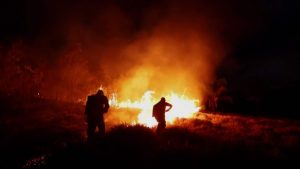Bangladesh opposition party launches general strike ahead of general election

Bangladesh’s main opposition party on Saturday started a 48-hour general strike on the eve on a general election, calling on people to boycott the vote because it says the government of incumbent Prime Minister Sheikh Hasina can’t guarantee its fairness.
Hasina is seeking a fourth consecutive term in power. The main opposition Bangladesh Nationalist Party (BNP), led by former premier Khaleda Zia, has vowed to disrupt the election through the strike and boycott.
Detectives arrested seven men belonging to the BNP and its youth wing for their alleged involvement in a deadly arson attack on a passenger train on Friday night, the head of Dhaka’s Detective Branch, Harun Or Rashid, said Saturday.
Campaigning in the nation of 169 million people has been marred by violence, with at least 15 people killed since October. Bangladesh is a parliamentary democracy but has a history of military coups and assassinations.
On Saturday, a small group of BNP supporters marched across Dhaka’s Shahbagh neighborhood, calling on people to join the strike. Another rally by about 200 left-wing protesters took place outside the National Press Club to denounce the election.
The Election Commission said ballot boxes and other election supplies had been distributed in preparation for the vote on Sunday in over 42,000 precincts. There are more than 119 million registered voters.
Election ‘skewed’: BNP official
Ruhul Kabir Rizvi, a BNP senior official, repeated his party’s demand for Hasina to resign, calling the election “skewed.”
“The government is again playing with fire. The government has resorted to its old tactics of holding a one-sided election,” he said.

Chief Election Commissioner Kazi Habibul Awal told reporters on Saturday that the parliamentary election would be free and fair.
Awal also said that had the BNP participated, the election would have been “more competitive” and “more festive.” He acknowledged the recent violence may have a negative impact on voters turning up on Sunday.
On Friday, an apparent arson attack on a train in Dhaka killed four people. Mahid Uddin, a Dhaka Metropolitan Police official, said the fire was “clearly an act of sabotage” aimed at scaring people ahead of the election. Police are seeking those responsible.

Foreign Minister A.K. Abdul Momen said in a statement Saturday that the timing of the attack was meant to hinder the democratic process.
Police said a murder case was filed by a railway official on Saturday, accusing unidentified people as suspects.

Talha Bin Jasim, an official with the Fire Service and Civil Defence in Dhaka, told The Associated Press by phone on Saturday night that at least 18 arson attacks had been reported across the country since midnight Friday.
He said that at least 10 polling stations were among them, with police calling them acts of sabotage.
The Election Commission has asked authorities to increase security around polling stations.
Faruk Hossain, a Dhaka Metropolitan Police spokesperson, told The Associated Press police had reinforced security across Dhaka and that railway transportation was back to normal following Friday’s attack.
Leaders at odds
Bangladesh’s increasingly polarized political culture has been dominated by a struggle between two powerful women, Hasina and Zia.

Zia, head of the BNP, is ailing and currently under house arrest. Her party says the charges of corruption are politically motivated, an allegation the government denied.
Tensions have spiked since October when violence broke out at a massive anti-government rally demanding Hasina’s resignation and a caretaker government to oversee the election. Hasina’s administration said there was no constitutional provision to allow a caretaker government.
Critics have accused Hasina of systemically suffocating the opposition via repressive security measures.
Zia’s party claimed that more than 20,000 opposition supporters have been arrested, but the government said those figures were inflated and denied arrests were made due to political leanings. The attorney general put the figure between 2,000-3,000 while the law minister said the numbers were about 10,000.









